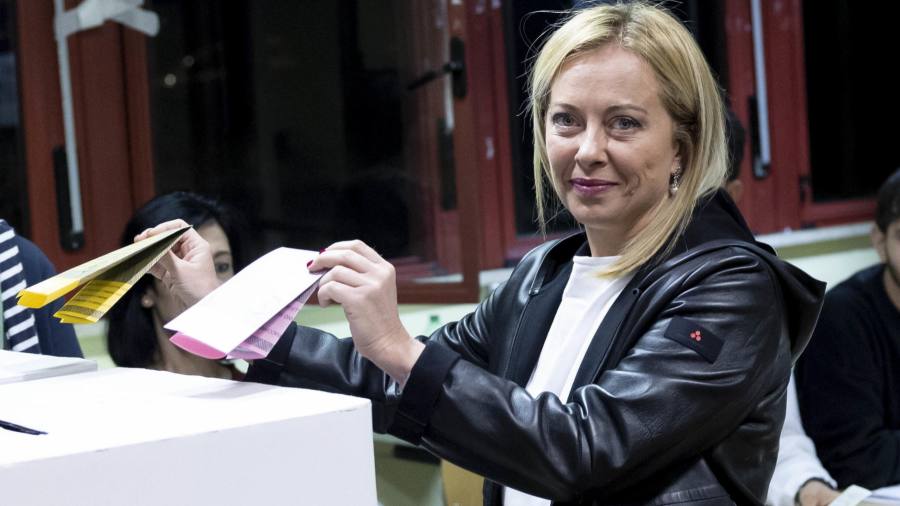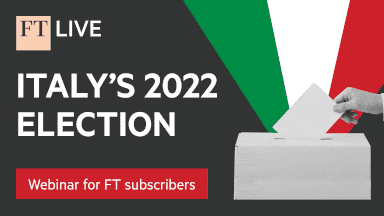
A rightwing coalition led by Giorgia Meloni’s Brothers of Italy is on course for a decisive victory in Italy’s snap election, having trounced a range of rivals that failed to forge a unified front to compete more effectively against the bloc, exit polls showed.
Meloni’s coalition — with Matteo Salvini’s nationalist League and media tycoon and former premier Silvio Berlusconi’s Forza Italia — is believed to have secured between 42 and 49 per cent of the total vote, enough to take a comfortable parliamentary majority.
However, the rightwing coalition appears to have fallen short of the two-thirds of seats it would need to the press ahead with its plans to amend Italy’s constitution, the polls indicated.
Under Italy’s complicated election system, a third of parliamentary seats are awarded in first-past-the-post races, which gave a significant advantage to the centre-right parties that united behind a single candidate in each of those areas, while their opponents squabbled among themselves.
Meloni’s Brothers of Italy, which is an heir to the neo-fascist movement, will be the largest party in the new parliament, with around a quarter of the votes. It looks likely to have taken a greater percentage than the League and Forza Italia combined, the exit polls showed.
The results mark a triumph for Meloni, given that the Brothers of Italy secured just 4 per cent of the vote in the last general election in 2018, though analysts cautioned that her support could prove ephemeral given the severe challenges she will face.
“If you look at the last 30 years, there has been a succession of people who sell themselves as being new, grab attention for a while, usually find it hard to deliver and then people get angry. The electorate quickly moves on to somebody else,” said Daniele Albertazzi, a professor of politics at the University of Surrey.
Italy’s election process has been closely watched in Brussels and Washington, where policymakers are anxious about what the new government will mean for Rome’s relationship with the EU and Italy’s approach to the war in Ukraine.
Outgoing prime minister Mario Draghi took a strong stand against the Russian invasion and helped craft tough EU sanctions against Moscow. Meloni has also been fiercely critical of the invasion, and pledged to maintain the strong stand against Russia.
But her partners’ views are more ambiguous. Salvini, a longtime Putin admirer, has complained about the toll that sanctions have taken on Italian families and businesses, while Berlusconi, 86 on Friday, appeared to justify the invasion, saying Putin had merely wanted to replace President Volodymyr Zelenskyy’s Kyiv government with “decent people”.
Global markets will also be watching anxiously to see the shape of the new government, particularly the make-up of the new cabinet — and who gets the critical job of finance minister.
In a note shortly after the polls closed on Sunday night, Moody’s, the credit rating agency, noted that Italy’s mountain of public debt — estimated at around 150 per cent of GDP — was “vulnerable to negative growth, funding cost and inflation developments”.
For all the intense international focus on the outcome, Italians themselves have been less than enthusiastic about the election, reflecting their deepening disenchantment with the political process.
By 7pm local time — four hours before the polls closed — just 51 per cent of the country’s 51mn eligible voters had cast their ballots, down from the 58 per cent that had voted by the same time of day back in 2018. The final turnout is expected to be significantly lower than the previous all-time low of 73 per cent in those 2018 polls.
“The perception is whether you vote or whether you don’t vote, nothing really changes and that all the politicians are equal,” said Valerio Alfonso Bruno, a fellow at the UK-based Centre for the Analysis of the Radical Right. “A lot of Italians see politics this way, that if we have Meloni this time, really nothing new is going to happen.”
The rightwing coalition has promised Italians that they would provide five years of stable, effective government — something that has long eluded the country. But despite the bloc’s apparent comfortable majority, analysts warned of turbulence as a result of personal rivalries among the three leaders, particularly the fading Salvini’s resentment of the ascendant Meloni.
“I don’t think we are going to have another election soon, but we are going to see constant fighting,” Albertazzi said. “The life of the government is very unlikely to be quiet and plain sailing.”
Before polls opened, Rudy Giuliani, the close political ally and former lawyer for Donald Trump, tweeted his support of Meloni and Salvini, expressing hope that “Italians will choose them to wisely guide their nation and to make Italy great again.”
FT Live event

Join FT journalists and special guest for a subscriber-only webinar on September 27 to discuss the outcome of Italy’s watershed election